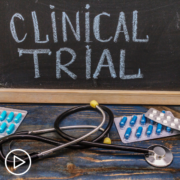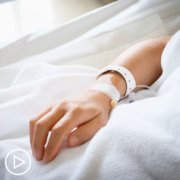How Is Advanced Prostate Cancer Treated? from Patient Empowerment Network on Vimeo.
What therapies are available to treat advanced prostate cancer? Expert Dr. Atish Choudhury reviews current treatment options.
Dr. Atish Choudhury is the Co-Director of the Prostate Cancer Center at Dana-Farber/Brigham & Women’s Cancer Center.
Learn more about Dr. Choudhury here.
See More from Engage Prostate Cancer
Related Resources
Transcript:
Katherine:
So, let’s walk through the types of therapy that are used today to treat prostate cancer. If you would start with surgery?
Dr. Choudhury:
Sure. So, surgery is a radical prostatectomy, and they take out the prostate – they take out neighboring structures called seminal vesicles, they take out the surrounding fat, and they’ll usually take out some neighboring lymph nodes as well. And there are advantages of surgery in that when the prostate is out, the pathologist can examine the whole prostate front to back, side to side, as well as those neighboring structures to really understand the stage of the cancer – “Where is it?” – and also, the grade – “Is it a high-grade cancer, a low-grade cancer, somewhere in the middle?”
And it really helps guide “What is the risk of developing recurrence afterwards, and are there further treatments that we should be giving after the surgery? For example, radiation to the prostate bed to decrease the risk of recurrences. Surgery does have its own set of potential side effects and complications, so it’s not appropriate for everyone, but in general, that’s the process.
Katherine:
What other treatment options? You mentioned radiation. What else is there?
Dr. Choudhury:
Yeah, so, radiation comes in two forms: there’s seed radiation, which is implantable little radioactive pellets that are implanted throughout the prostate. And then, there’s external radiation, and that can be given in several forms and over several schedules that it’s really important to discuss with the care team.
The other forms of treatment that people on this call might’ve heard about or read about are in a category called “focal treatments,” and these are basically ways to – and the term we use is a blade but zap – an area of the prostate using lasers, or high-intensity ultrasound, or with freezing an area of the prostate, or with something called “irreversible electroporation.”
These are basically all ways to, again, zap an area of the prostate either with heat or with cold with the intention of killing off cancer cells in an area. And the trouble is that none of these treatments have actually been demonstrated to improve outcomes related to prostate cancer compared to just surveillance alone. And it does complicate, sort of, the monitoring afterwards to see if something has come back.
But there might be very selected patients where there’s an area of cancer that’s seen on a scan – like an MRI – with no cancer seen outside of that area who might decide to pursue this possibility of focal treatment with the goal of maybe putting off the need for something like radiation or surgery. But that’s something that really should be discussed with a multidisciplinary team so that people really understand what they’re getting into in terms of risks and potential benefits.
So, those treatments are not really considered standard at this time.
Katherine:
What about hormonal therapy?
Dr. Choudhury:
Yeah, so, hormonal therapy plays a role in the treatment of prostate cancer, really depending on the stage and the other treatments that are being considered. So, for example, if a patient is going to surgery for a localized prostate cancer, in general, we wouldn’t use hormonal treatment either before or after the surgery unless they’re planned for radiation after the surgery.
However, for patients who have intermediate risk or higher localized prostate cancer and are getting radiation, then we will often recommend hormonal treatments, which are basically testosterone-lowering drugs, to make the radiation work as well as possible. And then, for patients who have advanced cancer beyond where surgery or radiation is going to be of help, then, hormonal treatments are important to treat the cancer wherever it is.
And that’s because prostate cancer cells, wherever they are in the body – wherever they’re in the prostate itself, or in lymph nodes, or bones, or other organs – depend on the testosterone in your body to supply a fuel – to support its growth and survival.
And so, lowering the level of testosterone in the body basically deprives the cancer cells of that fuel and starts a process of killing cancer cells even without any need for radiation, or chemotherapy, or things like that. However, hormonal treatments are not curative. They don’t kill all the cancer – they kill some and put the rest to sleep. And so, if you stop the hormonal treatment, the cancer will grow back, and that’s why it’s not a treatment on its own for localized prostate cancer.
And that’s also why, for prostate cancer that’s spread, we often add on additional medications to the testosterone-lowering drugs to be more effective at really killing the cancer wherever it is compared to the testosterone suppression alone.
Katherine:
Oh, I see. For advanced disease, what treatments are available for patients that are hormone-sensitive or -resistant?
Dr. Choudhury:
Yeah, so “hormone-sensitive” means that the cancer has advanced, but the patient hasn’t started on testosterone-lowering drugs yet. And so, as I had mentioned, testosterone lowering is really the backbone of treatment of these patients. And so, there are additional treatments that have been demonstrated previously to be effective after testosterone-lowering by itself stops working, and these include a chemotherapy drug called docetaxel. And in addition, there are more potent hormonal drugs called abiraterone, enzalutamide, apalutamide, and darolutamide.
And the role of these other drugs is to block hormonal signaling within the cancer cells from hormones other than testosterone. And so, by doing the more potent hormonal drug in conjunction with the testosterone lowering, that leads to a much deeper response – much more tumor shrinkage – and, it turns out, also prolonged survival in patients treated with those combination treatments – compared top people who are treated with testosterone lowering alone and then receive these drugs later.
So, there’s something about treating more aggressively at the beginning in this hormone-sensitive state that plays out in prolongation of survival. And not only prolonged survival, but improved quality of life due to delaying the symptoms of cancer grown and progression.
Katherine:
Right.
Dr. Choudhury:
When we then talk about castration resistant disease, certainly we use the same classes of drugs, but then, there’s a wider armamentarium of things that we use that include, again, other kinds of chemotherapy.
There are radiation drugs, and an approved drug Radium-223. And there’s another drug on the horizon called Lutetium PSMA. There are immune therapy drugs – something called Sipuleucel-T – and then, this is also a situation where we do genetic testing of the cancer to understand if there’re certain –what we call “therapeutic vulnerabilities.”
Other treatment options that are available based on the genetics of the cancer that might be helpful in some people? And specific options include a chemo-immune therapy called “Keytruda” in a small subset of patients with particular genetic changes involving genes involved in mismatched repair of DNA. And then, there’s another set of targeted treatments called “PARP inhibitors” for certain sets of patients who have alterations in genes involved in homologous recombination repair of DNA.
So, that’s all very complicated, and so that’s why it’s important to get treated with high-volume providers of prostate cancer patients so that they’re really aware and onboard with these various treatment options that are available.



















